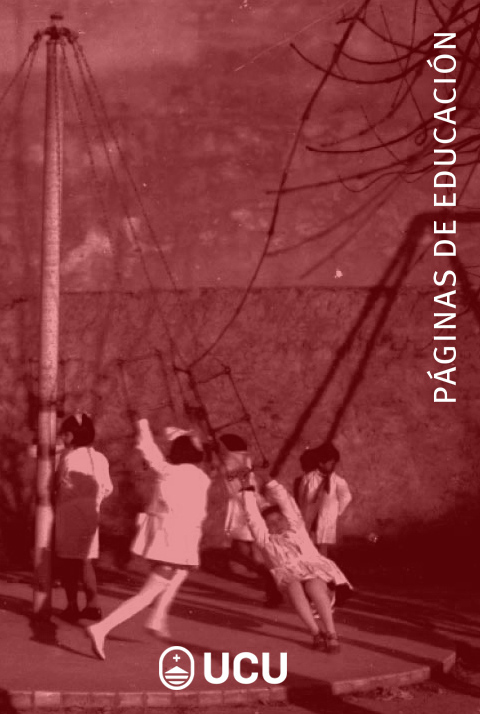Interpersonal communication in clinical practice. Learning experience in a group of dental students
DOI:
https://doi.org/10.22235/pe.v16i1.3024Keywords:
interpersonal communication, clinical practice, dental studentsAbstract
Interpersonal communication in clinical practice affects patient satisfaction, clinical outcomes, and the well-being of healthcare staff. However, the need to incorporate communication skills into healthcare personnel training remains an unresolved issue. This qualitative case study aims to understand the challenges faced by a group of Dentistry students in managing communication with patients, as well as to explore their perceptions regarding their initial experience with interpersonal communication training. Data is collected through participant observation, narratives, and in-depth interviews, and processed using content analysis. The students' challenges include maintaining boundaries, handling empathy, and persuading patients to comply with treatment. They report changes in their communication with patients, which they attribute to their participation in the training experience.
Downloads
References
Bascuñán, M. L., Roizblatt, A., & Roizblatt, D. (2007). Comunicación de malas noticias en medicina: un estudio exploratorio. Revista de Medicina de la Universidad de Navarra, 51(2), 28-31. https://doi.org/10.15581/021.9132
Berry, M., Rodrigues, V., Evans, J. L., de Souza, M. I. D. C., & Reher, V. (2022). Design of a communication skills course in dentistry: Applying active‐learning strategies to improve educational outcomes. European Journal of Dental Education, 26(3), 577-585.
Briñol, P., Horcajo, J., Valle, C., & De Miguel, J. (2007). Cambio de actitudes a través de la comunicación. En J. F. Morales, C. Huici, M. Moya, & E. Gaviria, Psicología Social (3.ª ed., pp. 491-516). McGraw-Hill.
Buduneli, N. (2020). Communication Skills of the Clinician and Patient Motivation in Dental Practice. Current Oral Health Reports, 7, 202-207. https://doi.org/10.1007/s40496-020-00273-3
Coad, J., Smith, J., Pontin, D., & Gibson, F. (2018). Consult, negotiate, and involve: evaluation of an advanced communication skills program for health care professionals. Journal of Pediatric Oncology Nursing, 35(4), 296-307.
Díaz-Martínez, L., Cuesta Armesto, M., & Díaz Rojas, M. J. (2020). La formación médica en comunicación de malas noticias: Una revisión narrativa. Revista Española de Educación Médica, 2, 32-42. https://doi.org/10.6018/edumed.439731
Frankel, R. M., & Sherman, H. B. (2015). The secret of the care of the patient is in knowing and applying the evidence about effective clinical communication. Oral Diseases, 21, 919-926. https://doi.org/10.1111/odi.12250
Gálvez Herrer, M., Gómez García, J., Delgado, M., Cruz, M., & Ferrero, M. (2017). Humanización de la sanidad y salud laboral: implicaciones, estado de la cuestión 18 y propuesta del Proyecto HU-CI. Medicina y Seguridad del Trabajo, 63(247), 103-119. https://scielo.isciii.es/scielo.php?script=sci_arttext&pid=S0465-546X2017000200103
Gillett, K., O’Neill B., & Bloomfield, J. (2016). Factors influencing the development of end-of-life communication skills: A focus group study of nursing and medical students. Nurse Education Today, 36, 395-400.
Goffman, E. (1959). La presentación de la persona en la vida cotidiana. Amorrortu.
Gupta, S., & Shaw, J. (2019). Development of medication-related counselling skills in senior medical students: a checklist-based approach. BMC Medical Education, 19(335), 1-6.
Korthagen, F. (2017). Inconvenient truths about teacher learning: towards professional development 3.0. Teachers and Teaching, 23(4), 387-405. https://doi.org/10.1080/13540602.2016.1211523
León, O., & Montero, I. (2015). Métodos de investigación en psicología y educación. McGraw Hill.
Llor Lozano, J., Seva Llor, A. M., Díaz Agea, J. L., Llor Gutiérrez, L., & Leal Costa, C. (2020). Burnout, habilidades de comunicación y autoeficacia en los profesionales de urgencias y cuidados críticos. Enfermería Global, 19(3), 68-92. https://doi.org/10.6018/eglobal.381641
Luetsch, K., & Rowett, D. (2016). Developing interprofesional communication skills for pharmacists to improve their ability to collaborate with other professions. Journal of Interprofesional Care, 30(4), 458-465.
Lutz, G., Roling, G., Berger, B., Edelhäuser, F., & Scheffer, C. (2016). Reflective practice and its role in facilitating creative responses to dilemas within clinical communication – a qualitative analysis. BMC Medical Education, 16(301), 1-9.
Manes, F., & Niro, M. (2021). Seres humanos. Grupo Editorial Planeta.
Moore, R. (2022). Maximizing Student Clinical Communication Skills in Dental Education. A Narrative Review. Dentistry Journal, 10(57), 1-15. https://doi.org/10.3390/ dj10040057
Moya Morales, M. (2000). Persuasión y cambio de actitudes. En J. F. Morales Domínguez, C. Huici Casal (coords.), Psicología social (pp. 153- 170). McGraw-Hill.
Paternotte, E., Scheele, F., van Rossum, T.R, Seeleman, M. C., Scherpbier, A. J. J. A., & van Dulmen, A. M. (2016). How do medical specialists value their own intercultural communication behaviour? A reflective practice study. BMC Med Educ, 16, 222. https://doi.org/10.1186/s12909-016-0727-9
Rizo García, M. (2019). La comunicación como relación e interacción. Un mapa general de acepciones teórico-conceptuales y un apunte sobre sus posibilidades empíricas en los estudios sobre interculturalidad. Revista Iberoamericana de Comunicación, 36, 147-174. https://ric.ibero.mx/index.php/ric/article/view/31/25
Ruben, B. D. (2016). Communication theory and health communication practice: the more things change, the more they stay the same. Health communication, 31(1), 1-11.
Sánchez-Angarita, J. (2017). La dimensión comunicativa en la formación del médico: una propuesta para fortalecer la relación médico-paciente. Revista de la Facultad de Medicina, 65(4), 641-648. http://doi.org/10.15446/revfacmed.v65n4.59892
Schön, D. (1987). La formación de profesionales reflexivos. Hacia un nuevo diseño de la enseñanza y el aprendizaje en las profesiones. Paidós.
Schön, D. (1998). El profesional reflexivo. Cómo piensan los profesionales cuando actúan. Paidós.
Sukhlecha, A., Dass, R., Tiwari, D. S., Anand, N. I., & Dholakia, H. J. (2016). Structured communicative skills training for medical interns improves history taking skills on sensitive issues: An interventional study. Medical Journal of Dr. D.Y. Patil University, 9(5), 579-584. https://doi.org/10.4103/0975-2870.192167
Toivonen, A. K., Lindblom-Ylänne, S., Louhiala, P., & Pyörälä, E. (2017). Medical students’ reflections on emotions concerning breaking bad news. Patient Education and Counseling, 100(10), 1903-1909.
Velázquez Tamez, L. (2020). Convergencias disciplinarias en la formación médica: comunicación y derecho para reducir la práctica médica defensiva. Investigación en Educación Médica, 9(33), 79-88.
Yañez, G., López-Mena, L., & Reyes, F. (2011). La técnica de incidentes críticos: una herramienta clásica y vigente en enfermería. Ciencia y Enfermería, 17(2), 27-36.
Published
How to Cite
Issue
Section
License
Copyright (c) 2023 Páginas de Educación

This work is licensed under a Creative Commons Attribution 4.0 International License.















